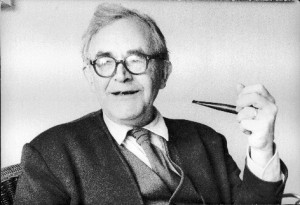Today is Protestant theologian Karl Barth‘s birthday (1886-1968).
The responses to Nicholas Graham’s query posted Sunday mention Karl Barth and include a digression into Frye’s attitude toward fascism, so we’re putting up two anniversary posts today: one relating to Barth and the other (below) to Nazi book burning.
Frye cites Barth on the metaphor of creation in Creation and Recreation:
I want to begin with what is called “creativity” as a feature of human life, and move from there to some of the traditional religious ideas about a divine creation. It seems to me that the whole complex of ideas and images surrounding the word “creation” is inescapably a part of the way that we see things. We may emphasize either the divine or the human aspect of creation to the point of denying the reality of the other. For Karl Barth, God is a creator, and the first moral to be drawn from this is that man is not one: man is for Barth a creature, and his primary duty is to understand what it is to be a creature of God. For others, the notion of a creating God is a projection from the fact that man makes things, and for them a divine creator has only the reality of a shadow thrown by ourselves. But what we believe, or believe that we believe, in such matters is of very little importance compared to the fact that we go on using the conception anyway, whatever name we give it. We are free, up to a point, to shape our beliefs; what we are clearly not free to do is alter what is really a part of our cultural genetic code. We can throw out varieties of the idea of creation at random, and these, in Darwinian fashion, will doubtless descend through whatever has the greatest survival value; but abolish the conception itself we cannot. (CW 4, 36)
